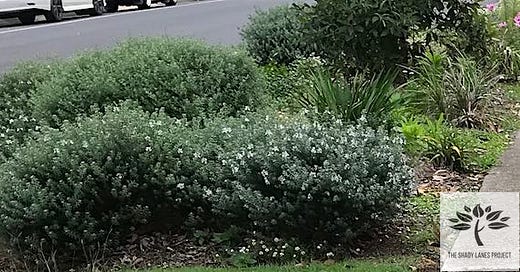Why Plant Choice Matters
In your own verge garden, you tend to look at it as a gardener standing in the centre, looking from your home outwards or looking at it from the road.
But what about your neighbours reversing out of their driveway, especially if, like me, you are on the crest of a hill?
What if you view the whole street as the long paddock?
Walking is the best way to connect with the urban long paddock. When you walk you to see the public spaces in the streets very differently to the fleeting and distanced view you get from within the private bubble of a car.
Does it have a welcoming approach? Are there plants poking out at you? What words spring to mind when you approach and walk through verge gardens during the day and at night? How do you want people to feel about your verge garden?
Planting a veggie patch would have created outrage in my very "hedge and lawn" street even though it would have fit within council guidelines.
I started more formally and used some westringia balls (picture below) and straight lines to reassure neighbours that it would still fit in. Over the years, as even the more doubtful neighbours have adapted, it has grown less formal.
Which of these words would describe gardens that you like, and gardens that would inspire you to plant your own? Which describe gardens that annoy you a bit or might even inspire you to make a complaint? How do you think people will describe yours?
proud, formal, natural, hostile, dangerous, flowers, always the same, boring, fussy, colourful, welcoming, regimented, always changing, safe, very messy, personal, full of life, overbearing, contribution to community, informal, professional, interesting, neat, expensive, intimidating, extension of their garden, friendly, a bit messy
This free article is part of the Understanding the Space section: bite-sized introductions to gardening in these small but wonderfully complex spaces.




